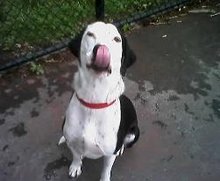Saturday, September 19, 2009
Carbohydrate and fat choices in a liver disease diet
Dogs on a low protein diet need carbohydrates and fats for energy. But many grain choices can be problematic and caution is recommended.
Grains, do break down into sugars and can result in yeast overgrowth. Grains are also high in glucose and bombard the liver, the very thing you want to avoid in a dog with liver disease. Grains, as well as dairy based products, are mucus forming (toxic fungal growth) and may contribute to health problems such as allergies, ear infections, skin problems, bloating, joint problems, malabsorption and digestive disorders.
For this reason, grains are not recommended for regular use in your dogs diet. Then only organic, freshly cooked grains that have not been refrigerated for more than one day.
Potatoes and sweet potatoes are very good for dogs, despite previous beliefs that they were toxic. They also contain healing powers. Potatoes are a cancer preventative and maintain blood pressure. Sweet potatoes prevent cancer and heart disease and assist in cleansing the blood. Wash well and cook with the peel on. I do mine in the microwave for 4 to 6 minutes. Potatoes can be stored in the refrigerator for three days in a air tight food container.
Barley is one of the few grains that has nutritional benefits. It prevents cancer reduces blood clots and improves digestion. Always use organic and refrigerate left overs for no more than one day.
Pasta can also be used and is a good choice in the early stages when the diet needs to be as bland as possible. Cook to direction and refrigerate no more than three days.
Note:
When refrigerating grains or carbs, always refrigerate them separately, never mixed with other vegetables or meats.
High levels of fat are discouraged in the diet of a dog with liver disease, but some fat is essential to their health. Seeds and nuts are a good source of protein and fat and are best digested fresh, raw and unsalted.They add needed fat that is hard to get on a soy based diet. Sliced almonds, pumpkin seeds or flax seed are all good choices. Oils are another good choice for the needed fat in a diet. Extra virgin olive oil, soy oil, flax seed oil or safflower oil are all good choices. Oils must be cold pressed.
Final Note:
Although I have only one dog with liver disease, I avoid grain diets in all three of my dogs. Besides the reasons outlined above, most commercial dog foods use low quality grains that are often the end result of the milling process. They do this because it keeps cost down, but there is absolutely no nutritional value to the grain. It is merely a filler.
The sad truth is the FDA has few regulatory standards for the quality of grains used or how the grains should be stored while awaiting shipment. Some of you may remember the Diamond Pet Food scare in 2006. Dogs were dying of liver failure at an alarming rate. The reason was the corn used in the food had gotten wet while in storage and had fermented. Customers were feeding their dog the kibble equivalent of grain alcohol.
Higher end pet food companies, tend to use whole grains but always read the label!
Labels:
carbohydrates and fats,
diet,
dogs,
liver disease
Subscribe to:
Post Comments (Atom)



No comments:
Post a Comment